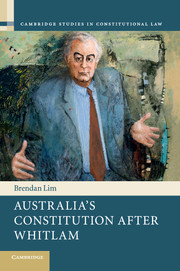4 - The Murphy Aff air
Published online by Cambridge University Press: 06 April 2017
Summary
The constitutional politics of the 1975 crisis primarily engaged the House of Representatives, the Senate and the Governor-General. Those politics took longer to engage the High Court. In part, the Court was, because of the hostile Senate, ‘significantly shielded from having to make hard decisions’. And, as I explained in the previous chapter, Whitlam was careful to advance his constitutional programme by appeal to accepted constitutional powers, albeit used in novel and more extensive ways. In response to legislation framed in that way, a strictly legalist institution like the High Court might not have been an especially effective forum for constitutional resistance or preservation. Indeed, most of Whitlam's legislation was upheld in the High Court. The looser constitutionalism of the political Senate proved a more powerful setting for conservatives to mount allegations of ‘unconstitutionality’.
But the clash between traditions of monism and dualism, over which the constitutional crisis of 1975 was fought, arrived in the Court in the early 1990s. Then, for the first time, the Court justified its powers of judicial review as an incident of popular sovereignty. It ceased to portray itself simply as an expert institution, which told governments when they had crossed the supposedly objective lines drawn by the Constitution. Instead, the High Court claimed its own authority to speak for the present constitutional people. It adapted for its own purposes the form of institutional claim that the Senate had articulated against Whitlam during the 1970s. The Court itself seemed to attribute its new voice to the legal effect of the Australia Act 1986 (Cth). Some attribute influence instead to Justice Lionel Murphy, who served on the Court from 1975 until 1986. I now go further, by attributing significance to Whitlam's constitutional agenda, and the 1975 constitutional crisis.
Whitlam's Attorney-General and judicial appointee, Lionel Murphy, is the transitional and transformative figure. For better or worse, he took the constitutional politics of the 1970s with him from the Senate to the Court. Whitlam appointed him in February 1975 after the unexpected death of Douglas Menzies. Murphy was, unsurprisingly, an important supporter and proponent of the government's substantive constitutional agenda. He had led major aspects of Labor's programme through the Parliament.
- Type
- Chapter
- Information
- Australia's Constitution after Whitlam , pp. 91 - 128Publisher: Cambridge University PressPrint publication year: 2017



